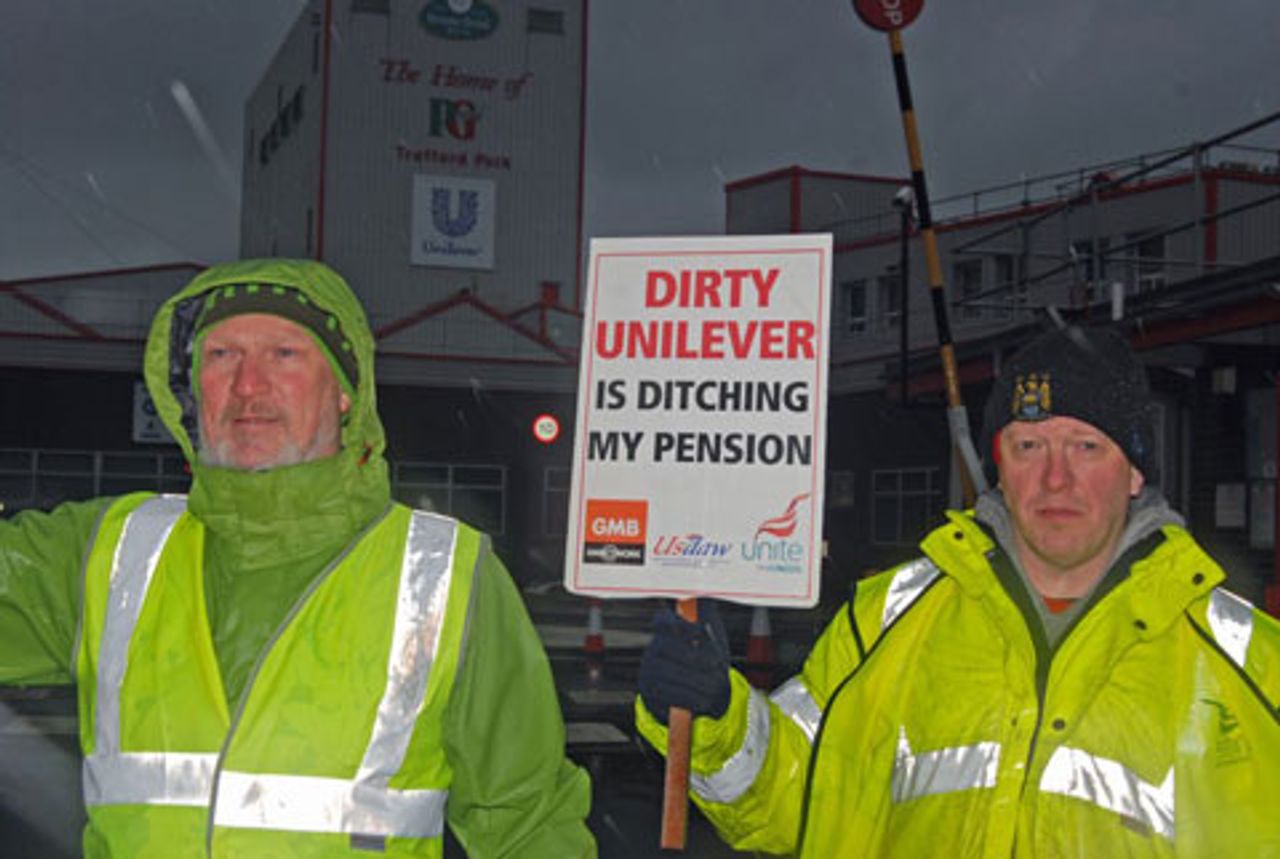As Unilever workers began organising picket lines across the country, the trustees of the company’s UK pension fund rejected union pleas and endorsed management’s proposal to close the existing final salary pension (FSP) scheme and replace it with an inferior career average earnings scheme, known as CARE.
 Picketing Unilever workers
Picketing Unilever workersIn a statement, the global consumer goods giant declared, “This was a tough but necessary choice which reflects the realities of rising life expectancy and increased global market volatility. We have a responsibility to protect the long term sustainability and competitiveness of the business—and to do so is in the best interests of our people.”
Workers will lose up to 40 percent of their pensions. One worker in Manchester has calculated a loss of more than £64,000. A report in the Financial Times claims the coalition government could abolish the index-linked protection for pensions. The protection mechanism injects an average of 2.5 percent a year. Removing it would save companies £7 billion annually.
The Guardian reported on January 18 that the trade unions have documented evidence that once the CARE scheme is accepted it will be replaced within three years by an even less generous scheme that relies heavily on how its investments perform.
The three unions at Unilever—Unite, USDAW and GMB—have limited action to 11 days of rolling strikes and worthless appeals to the trustees asking them to rein in senior managers and allow the conciliation service ACAS to broker talks.
The union also sent a letter to Unilever’s senior shareholders, the body set to gain the most by Unilever scrapping the FSP.
Unite, the largest union at Unilever, responded to the pension trustees’ January 20 news release by warning management not to view the decision as “a green light” for pushing through the pension changes, due to be implemented in July. Jenny Formby, the Unite national officer dealing with the dispute, claims in a press release, “It must be noted though, that the trustee board has stated that it does not welcome the company’s decision to cease final salary accrual, so this statement cannot be seen as a strong endorsement of the company’s proposals.”
This is so much hot air. The trustees have indeed green-lighted the company’s plans.
USDAW, the second largest union at Unilever, accused management of “continuing intransigence” and a “refusal to return to the negotiating table.” It expressed concern regarding the company disclosure that it is “currently not clear how the dispute will be resolved.”
The unions still claim that Unilever’s associates will take action against management. The USDAW statement ends, “Unilever’s customers, shareholders and other stakeholders could be forgiven for thinking that the company cares less for its employees and its corporate reputation than it does for one of its brands of soap powder or deodorant.”
All such statements are designed to chloroform the workforce, diminish the gravity of the attack they face and hold out the hope of a compromise.
The dispute has been ongoing since April 2011. In that time, the unions have organised publicity stunts involving sending workers to London to shout at the door of Unilever’s headquarters. In the last protest two figures dressed as the original founders of the company, the Lever Brothers, shouted that the present company leadership was shaming their reputations.
A one-day company-wide strike in December was greeted with enthusiasm from a workforce that has never struck in the company’s history. It was supported by non-union workers and those who joined the company after the CARE scheme was agreed for new entrants in 2008.
A January conference of factory delegates representing the unions rejected a nationwide strike. Instead, strikes have been organized to take place on different days and for different periods. The average was a 24-hour stoppage, while workers at Purfleet in Essex were out for four days. These rolling strikes were the central focus of the dispute with Southampton Council, which is one year old this week. Jobs have been cut and pay slashed by up to 5.5 percent while disruption has been minimized. Sacked workers are advised by Unite, Unison and GMB to seek redress in the law courts.
The actions of the unions at Unilever take place under conditions in which, at a national level, the trade unions are preparing a major betrayal of the fight against the government’s assault on public sector pensions.
On November 30, local government unions representing 2.5 million workers organized a one-day protest strike against efforts to cut public sector pensions, while hiking up workers’ contributions and the age of retirement. All the unions involved are now participating in negotiations that accept the government’s essential demands.
Subscribe to the IWA-RFC Newsletter
Get email updates on workers’ struggles and a global perspective from the International Workers Alliance of Rank-and-File Committees.
